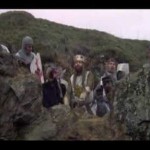We run our website the way we wished the whole internet worked: we provide high quality original content with no ads. We are funded solely by your direct support. Please consider supporting this project.

When God Discovers
Scripture consistently portrays God’s knowledge as conforming to the ways things really are, and part of the way things really are is temporally conditioned. Scripture never expresses the commonly-held sentiment that time is somewhat illusory. God “remembers” the past and anticipates the future. Insofar as he empowers humans to freely determine the future, this means that God waits “to see” what shall come to pass.
In Gen 2:19, after God created the animals, he brought them before Adam “to see what he would call them.” This word “to see” means something like “to discover.” God’s sovereign control of the world does not rule out an element of uncertainty about the future. God empowers humans to be genuine partners in bringing about the future, and this means that the future is, to some extent, dependent on what we do. God waits to see how humans will choose.
Another example is found when the Lord forbids the Israelites from gathering more than a day’s ration of bread from heaven when they were in the wilderness because he wants to “test them, whether they will follow my instruction or not” (Ex 16:4). By the Lord’s own admission, there would have been no point for this testing if the Lord was already certain how they would behave.
God tested Abraham to see how he would respond when asked to sacrifice Isaac (Gen 22). Moses tells the Israelites that they wandered in the wilderness for 40 years so that they Lord would know their heart (Deut 8:2). The Lord temporarily withdrew support from Israel to “find out if they would obey the command of the Lord” (Judg 3:4). God leaves Hezekiah “to himself” at one point “in order to test him and to know all that was in his heart” (2 Chron 32:31).
If we take these passages at face value, they suggest that God was not certain how they would respond to his tests before he gave them. He tested them to find this out.
Opponents of the open view often argue that God tests people not for his sake but for ours. This interpretation would be possible except that each of the verses we just examined explicitly tells us that the testing was for God, not the people being tested. An interpretation that reverses what a text explicitly says is not a viable interpretation. Others argue that if we took these verses literally we would have to deny that God possesses exhaustive present knowledge, for the passages say God wanted to know “their heart.” Since Scripture informs us that God knows all things while teaching us that God tests people to know their heart, the understanding of “heart” which this objection presupposes cannot be correct. The two teachings are easily rendered compatible by recognizing that the heart is the seat of the person’s will. To discover a person’s “heart” is to discover what their decision will be. Each of these passages, if read in context, makes this clear. The Lord tests people “to know what was in your heart, whether or not you would keep his commandments” (Deut 8:2). Since people are free agents, God wants to find out “whether they will follow my instructions or not” (Ex 16:4).
—Adapted from Satan and the Problem of Evil, pages 105-107
Photo Credit: Claudel Rheault via Unsplash
Category: General
Tags: Divine Foreknowledge, Free Will, Open Theism
Topics: Open Theism
Related Reading

What is the significance of Jeremiah 18:7–11?
The Lord states that “if that nation, concerning which I have spoken, turns from its evil, I will change my mind about the disaster that I intended to bring on it.” But if a nation which he has declared he will bless “does evil in my sight…I will change my mind about the good that…

Lighten Up: Underestimated
Frank Viola is at it again. He seems pretty confident that when he and I debate the Open Future this fall that he’ll smear me. That’s his prediction, anyway. The think is, I’ve been underestimated before. It happens all the time. People think I’m this goof who doesn’t know what he’s talking about. That’s OK…

The Hexagon of Opposition
Throughout the western philosophical and theological tradition, scholars have assumed that the future can be adequately described in terms of what will and will not happen. In this essay I, Alan Rhoda and Tom Belt argue that this assumption is mistaken, for the logical contradictory of will is not will not but might not. Conversely,…

How do you respond to John 6:64, 70–71?
Jesus told his disciples, “‘But among you there are some who do not believe.’ For Jesus knew from the first who were the ones that did not believe, and who was the one that would betray him” (vs. 64). Jesus continued, “‘Did I not choose you, the twelve? Yet one of you is a devil.’…

Neo-Molinism and the Infinite Intelligence of God
Classical Molinism holds that, since God is omniscient and knows all truths, he knows not only what every agent will do in the future, but also what every agent would have done in every other “possible world.” In this essay I argue that classical Molinism overlooked a whole category of truths that an omniscient God…

If God Can’t Control, How Can I Trust Him?
Question: If God can’t always answer our prayers for healing, for example (and I completely understand why—free will etc), then HOW can he promise to bring good out of the bad things that happen? Surely he is powerless to do that too? And if he can bring good why can’t he therefore heal in the…
